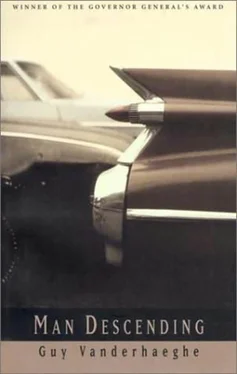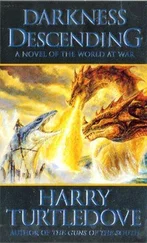“Get him on the telephone.”
“Your son, if you remember,” Mrs. Hax says, “got a little upset about all those long-distance phone calls – collect. And his words to me were, ‘Mrs. Hax, I think it best if my father phone only on important matters, at your discretion.’ At my discretion, mind you. And my discretion informs me that this isn’t one of those times. I’ve got a responsibility to my employer.”
“I’ll phone him myself.”
“That I’ve got to see.”
“I will.”
“Yes, like the last time. Half the time you can’t remember the city John lives in, let alone his street. The last time you tried to phone him you got the operator so balled up you would have been talking to a Chinaman in Shanghai if I hadn’t stepped in and saved your bacon.”
“I’ll phone. I can do it.”
“Sure you will. Where does John live?”
“I know.”
“Uh-huh, then tell me. Where does he live?”
“I know.”
“Jesus, he could be living in the basement and you wouldn’t realize it.”
This makes him cry. He realizes she is right. But minutes ago he had known where his son lived. How could he have forgotten? In the sudden twistings and turnings of the conversation he has lost his way, and now he hears himself making a wretched, disgusting noise; but he cannot stop.
Mrs. Hax feels she has gone too far. She goes over to him and puts an arm around his shoulders. “Now see what’s happened. You went and got yourself all upset over a silly old bowl of porridge. Doctor says you have to watch that with your blood pressure. It’s no laughing matter.” She boosts him out of his chair. “I think you better lie down on the chesterfield for a bit.”
Mrs. Hax led him into the living-room and made him comfortable on the chesterfield. She wondered how an old bugger like him could make so much water: if he wasn’t peeing, he was crying.
“You want a Kleenex?” she asked.
He shook his head and, ashamed, covered his face with his forearm.
“No harm in crying,” she said bleakly. “We all do some time.”
“Leave me be.”
“I suppose it’s best,” she sighed. “I’ll be in the kitchen clearing up if you need me.”
Dieter lay on the chesterfield trying to stifle his tears. It was not an easy job because even the sound of Mrs. Hax unconcernedly clacking the breakfast dishes reminded him of her monstrous carelessness with everything. His plates, his feelings. He filled with anger at the notion that he would never be nimble enough to evade her commands, or even her wishes. That he cannot outwit her or even flee her.
The living-room gradually darkens as the low, scudding rain clouds blot out the sun. He wishes it were a fine sunny day. The kind of day which tricks you into believing you are young and carefree as you once were. Like in Rumania before his family emigrated. Market days almost always felt that way. People bathed in sun and noise, their wits honed to a fine edge for trading and bartering. Every kind of people. The Jews with their curling side-locks, the timid Italian tenant farmers, the Rumanians, and people like himself, German colonists. Even a gypsy or two. Then you had a sense of life, of living. Every good thing the earth offers or man’s hand fashions could be found there. Gaily painted wagons, piles of potatoes with the wet clay still clinging to them; chickens, ducks and geese; tethered pigs tugging their back legs and squealing; horses with hooves as black and shining as basalt, and eyes as large and liquid-purple as plums.
Nothing but a sheet of sky above and good smells below: pickled herring and leather, paprika and the faint scent of little, hard, sweet apples.
Innocence. Innocence. But then again, on the other hand – yes, well, sometimes cruelty too. Right in the market.
A stranger arrived with a dancing bear once. Yes, the other bear, the one he had forgotten. He led him by a ring through the nose. When a crowd gathered, the man unsnapped the chain from the bear’s nose and began to play a violin. It was a sad, languorous tune. For a moment, the bear tossed his head from side to side and snuffled in the dirt. This, for him, was a kind of freedom.
But the man spoke to him sharply. The bear lifted his head and then mournfully raised himself up on to his hind legs. His arms opened in a wide, charitable manner, as if he were offering an embrace. His mouth grinned, exposing black-speckled gums and sharp teeth. He danced, slowly, ponderously, tiredly.
The music changed tempo. It became gay and lively. The bear began to prance unsteadily; the hot sun beat down on him. A long, glittering thread of saliva fell from his panting mouth on to the cinnamon-coloured fur of his chest.
Dieter, fascinated, tugged and pushed himself through the crowd. The bear hopped heavily from leg to leg. It was pathetic and comic. The pink tip of his penis jiggled up and down in the long hair of his loins. There was a wave of confused sniggering.
The trainer played faster and faster. The bear pirouetted wildly. He whirled and whirled, raising a small cloud of dust. The crowd began to clap. The bear spun and spun, his head lolling from side to side, his body tense with the effort of maintaining his human posture. And then he lost his balance and fell, blindly, with a bone-wrenching thump, onto his back.
The scraping of the violin bow stopped. The bear turned lazily on to his feet and bit savagely at his fleas.
“Up, Bruno!”
The bear whined and sat down. People began to laugh; some hooted and insulted the bear’s master. He flourished the bear’s nose lead and shouted, but the bear refused to budge. In the end, however, he could do nothing except attempt to save face; he bowed deeply, signifying an end to the performance. A few coins, a very few, bounced and bounded at his feet. He scooped them up quickly, as if he were afraid they might be reclaimed.
The audience began to disperse. Some hurried away to protect their wares. But Dieter had nothing to protect and nowhere to go, and so he stayed.
The sight of so many fleeing backs seemed to pique the bear. He got to his feet and began, once again, to dance. He mocked them. Or so it seemed. Of course, there was no music, but the bear danced much more daintily and elegantly than before, to a tune only he could perceive. And he grinned hugely, sardonically.
But the trainer reached up, caught his nose ring and yanked him down on all fours. He swore and cursed, and the bear breathed high, squeaking protests, feigning innocence.
This was unacceptable. This was rebellion. This was treason to the man who fed him, cared for him, taught him.
“Hairy bastard. Play the fool, will you,” the stranger muttered, wrenching and twisting the nose ring while the bear squealed with pain. The man punched his head, kicked him in the belly, shook him by the ears. “Traitor. Ingrate.”
Dieter held his breath. His mind’s eye had seen the bear suddenly strike, revenge himself. Yet nothing happened. Nothing; except the bear was beaten and battered, humiliated, even spat upon.
What shame he felt witnessing such an indignity, such complete indifference to the rightful pride of the bear. Such flaunting of the respect owed him for his size and his power. Couldn’t the man realize what he did? Dieter wanted to shout out the secret. To warn him that appearances deceive. That a bear is a man in masquerade. Perhaps even a judge, but at the very least a brother.
But he couldn’t. He ran away instead.
The house is still. He hears her footsteps, knows that she is watching him from the doorway. As always, she is judging him, calculating her words and responses, planning. Her plots deny him even the illusion of freedom. He decides he will not turn to look at her. But perhaps she knows this will be his reaction? Petulant, childish.
Читать дальше












